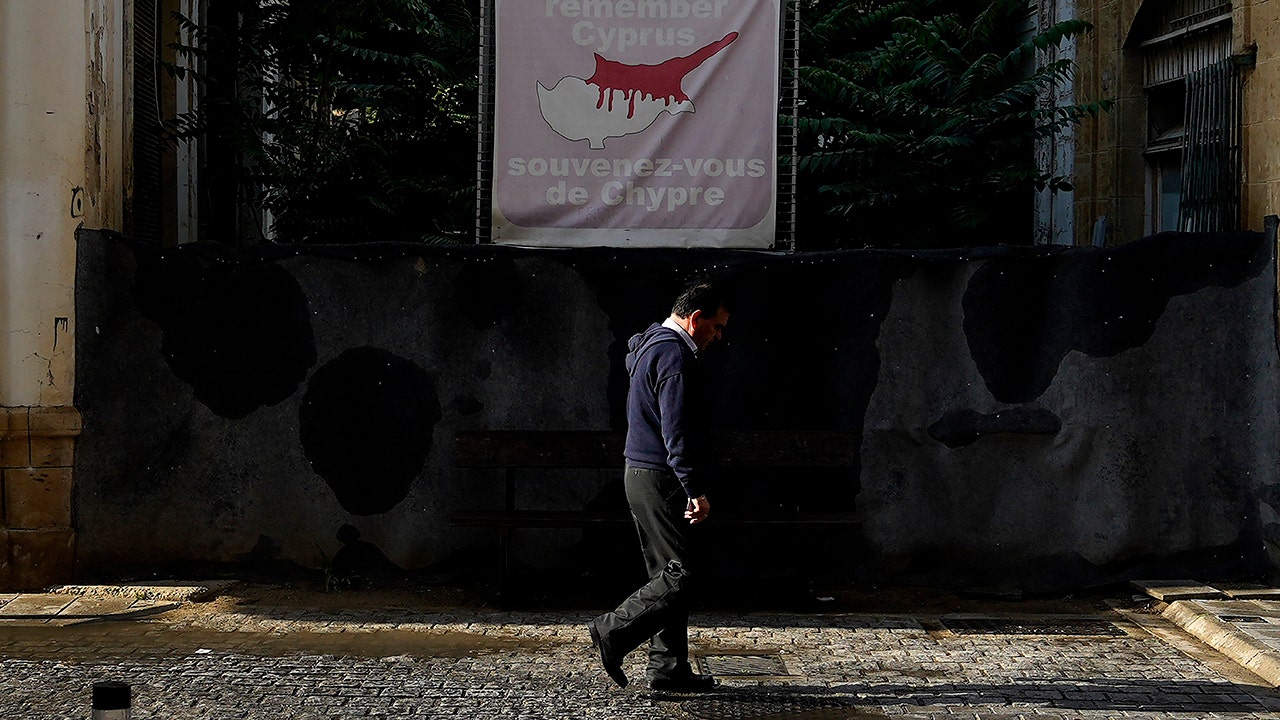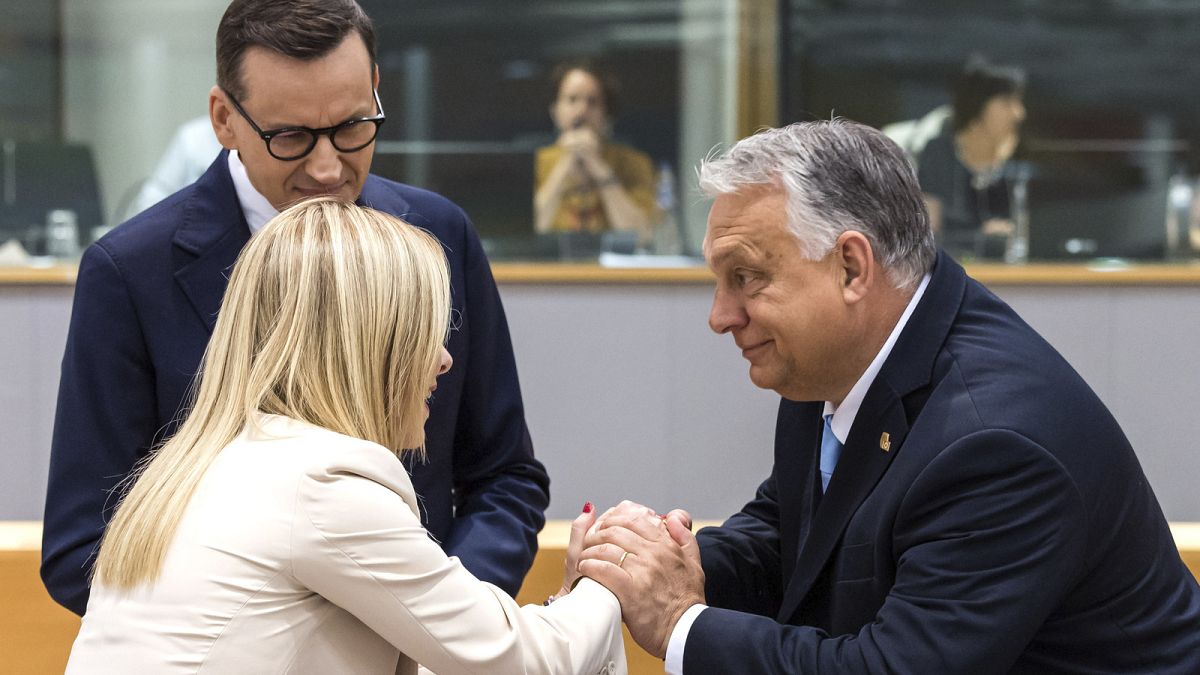World
The EU has to seek answers that go beyond short-term energy subsidies

The opinions expressed in this article are those of the author and do not represent in any way the editorial position of Euronews.
Brussels wants to extend regulations that permit EU member states to subsidise energy prices. While the sentiment behind this is to be lauded, the reality is that interventionism will ultimately distort the natural behaviour of the EU market and undermine its very future, Szymon Kardaś writes.
While the cost of electricity in Europe has stabilised through 2023, the prospect of a new price hike remains high for many EU member states like Poland, Hungary, Czech Republic, Austria, Lithuania, Latvia and Romania.
A pan-European reliance on imports, together with rising energy demands, continues to threaten market stability.
Moreover, unit costs, while not fluctuating to the extremes of last winter, are still stubbornly high in many countries including Denmark, Italy and the Netherlands, as well as the EU’s leading economy, Germany.
To alleviate some of the risks posed to member states, the European Commission recently extended the use of supporting instruments first introduced in 2022. On 20 November, it agreed to extend several regulations by six months, including the Temporary Crisis and Transition Framework.
This will allow members to provide aid to national entities, should electricity prices exceed the levels before the energy crisis, and has been followed up with proposals that would extend other anti-crisis measures, such as gas solidarity measures, the Market Correction Mechanism and rules related to permit-granting for renewable energy projects, into next year.
Frustration with crisis solutions grows
This interventionalist approach has landed well in many member states, and, for some incumbent administrations, is being used for their political gain ahead of the European elections in May.
Last month, Germany’s ruling coalition agreed on rules to provide aid to the energy-intensive industry; a programme set to run until 2028, with an estimated €28 billion budget.
Countries such as France and Poland are also among those in favour of maintaining subsidies, with the soon-to-be-formed Polish government announcing that they will maintain the electricity and gas price freeze for selected groups of consumers in 2024.
Beyond the protection of vulnerable groups of electricity consumers, one of the main arguments for maintaining the support measures is the fear of loss of competitiveness, and the risk that, due to high energy prices, European companies will consider migrating operations to the US or China.
Yet, in some EU countries, there is growing frustration at the continuance of crisis solutions, including Belgium, the Netherlands, Denmark, Estonia, and Finland, where politicians have pointed out that electricity prices have firmly stabilised over the year, and that maintaining special state aid rules is harmful to the EU market.
Subsidising favours the richer countries
While the risk of an increase in electricity prices in the EU over the next year exists, and the extension of some of the anti-crisis measures to 2024 seems fully justified, in the longer term, Brussels should be minded towards reducing the scope for subsidies. And there are several reasons for this.
First, subsidising electricity prices is extremely costly. According to the 2023 Report on Energy Subsidies, they have risen to €181bn across the EU in 2022 and could reach €194bn in 2023.
Second, maintaining the possibility of subsidising electricity prices in the long term might harm the EU energy market, deepening inequalities between member states, as a consequence of a subsidy race phenomenon, which disproportionately benefits richer countries.
This is well illustrated in the figures for 2022, which show that of the total amount of state aid approved by the EU, 53% went to Germany and 24% to France.
Divisions and headaches loom for 2024 and beyond if this behaviour becomes commonplace.
It also threatens the very existence of the European market, if the European Commission signals its intent to further extend certain anti-crisis regulations without proper appraisal.
The political leadership in Brussels should ensure they strictly assess the legitimacy of the provision of state aid in specific cases if interventionism is to persist in the short to medium term.
While, for member states, emphasis should turn to completing ongoing legislative amends to the electricity market design as soon as possible.
EU’s energy mix has to grow stronger
European Commission President Ursula von der Leyen spelt out some of the reforms needed to provide resilience back in 2022.
The new electricity market design aims to create a more flexible, competitive, and consumer-friendly electricity market, better able to accommodate the growing share of renewables in the EU’s energy mix.
It is now up to member states to close on the details of this proposal for legislative changes and bring forward regulations specifying, among other things, rules on investment for the expansion of generation capacity, such as renewable energy storage and nuclear power.
If they can do this, and veer away from subsidisation as a default response, there is an opportunity to stabilise electricity prices in Europe for the long term and reduce dependency on fossil fuels as primary sources of energy.
Such action, by members across the EU 27, would also encourage investment in Europe as a green energy global leader, and, importantly, provide underpinning to the EU and its ability to withstand future geopolitical shocks.
Szymon Kardaś is a senior policy fellow on energy within the European Power programme at the European Council on Foreign Relations (ECFR).
At Euronews, we believe all views matter. Contact us at view@euronews.com to send pitches or submissions and be part of the conversation.

World
Chances of Cyprus peace talks restart look dimmer as Turkish Cypriot leader sees no common ground

Chances of restarting formal talks to mend Cyprus’ decades-long ethnic division appeared dimmer Wednesday as the leader of the breakaway Turkish Cypriots told a U.N. envoy that he saw no common ground with Greek Cypriots for a return to negotiations.
Turkish Cypriot leader Ersin Tatar said that he conveyed to the U.N. secretary general’s personal envoy, María Ángela Holguín Cuéllar, that talks can’t happen unless separate Turkish Cypriot sovereignty in the island’s northern third first gains the same international recognition as the Cyprus republic in the Greek Cypriot south.
CYPRUS’ PRESIDENT CALLS ON EU TO TAKE ACTION AGAINST INFLUX OF SYRIAN REFUGEES FROM LEBANON
Tatar was quoted by Turkish Cypriot media as saying that a permanent Turkish military presence coupled with military intervention rights are prerequisites to any peace deal, despite Greek Cypriot attempts to “remove Turkey” from the settlement equation.
Tatar also expressed irritation with Holguín’s contacts with civil society groups that support an accord that would reunify Cyprus as a federation made up of Turkish Cypriot and Greek Cypriot zones, in line with a U.N.-endorsed framework.
A man walks across the U.N buffer zone in front of a blocked road as a banner shows the Cyprus island divided, the Turkish occupied area at the north and Cyprus republic at the south, in divided capital Nicosia, Cyprus, on Wednesday, May 15, 2024. Chances of restarting formal talks to mend Cyprus’ decades-long ethnic division appeared dimmer as the leader of the breakaway Turkish Cypriots told a United Nations envoy that he saw no common ground with Greek Cypriots for a return to negotiations. (AP Photo/Petros Karadjias)
The majority of Greek Cypriots reject a deal that would formalize a partition through a two-state deal, the permanent stationing of Turkish troops on the island, the right for Turkey to militarily intervene as well a demand for a Turkish Cypriot veto on all federal-level government decisions.
The Turkish Cypriot leader’s remarks don’t waver from a line that he’s consistently kept since his 2022 rise to power. But the fact that he remains unyielding despite four months of Holguín’s shuttle diplomacy doesn’t bode well for a talks restart.
Holguín was appointed at the start of the year to determine what the chances are of resuming formal talks seven years after the last major push for a deal collapsed amid much acrimony.
An agreement has defied numerous, U.N.-facilitated rounds of talks since 1974 when the island was cleaved along ethnic lines following a Turkish invasion preceded by a coup aimed at uniting the island with Greece. Only Turkey recognizes a Turkish Cypriot declaration of independence, and although Cyprus is a European Union member, only the south enjoys full membership benefits.
Holguín has refrained from speaking at length about her contacts over the last few months, but she noted in an interview with Kathimerini newspaper that it was up to the leaders to “listen to the people” and that she had been surprised at Tatar’s rejection of her proposal for a three-way meeting with Cypriot President Nikos Christodoulides.
Holguín will “soon” prepare a report for U.N. Secretary-General António Guterres about her findings over the last five months, according to U.N. deputy spokesman Farhan Haq.
Christodoulides struck a more upbeat note on Wednesday, saying that efforts for a resumption of talks continue and that time should be given for diplomacy to work.
World
Possible to cooperate with 'some' far-right personalities, says Michel

Michel’s comments at the Copenhagen Democracy Summit on Tuesday put him at odds with his own liberal family, Renew Europe, which is firmly opposed to cooperation with either ECR or ID.
It is possible to cooperate with “some” far-right personalities, says European Council President Charles Michel.
Michel made the comment at the Copenhagen Democracy Summit on Tuesday when he was asked about the upcoming elections to the European Parliament, where hard- and far-right parties are projected to enjoy a significant boost in representation.
“The question in the European Parliament will be: What are the political parties ready to cooperate (with), to collaborate to support Ukraine, to defend the democratic principles and to make the EU stronger?” Michel said on stage.
“If I’m observing the reality of some of those political parties that you qualify as the ‘far right,’ the reality is sometimes a bit more balanced in some of those personalities within those parties – personalities with whom it is possible to cooperate because they can share the same goals, the same views on those topics,” he went on.
“And with some others, in my opinion, it’s not possible to cooperate.”
Michel did not mention any party or personality by name, but his remarks seemed to refer to Italian Prime Minister Giorgia Meloni, whose three-party coalition has been described as the most right-wing in the country’s history.
Due to its strident Eurosceptic tone, Meloni’s campaign for Italy’s leadership had sent alarms ringing in Brussels. However, upon coming into office, the premier baffled critics by adopting a more pragmatic approach to EU politics, proving constructive on key issues such as support for Ukraine and migration reform, while remaining opposed to the Green Deal.
Meloni and her allies from the European Conservatives and Reformists (ECR) group, including Poland’s Law and Justice (PiS) and Spain’s Vox, are seeking to secure a sizeable share of seats in the next Parliament and further tilt the agenda to the right.
The shift has raised questions over how much the traditional mainstream parties are willing to accommodate, or even align with, the demands from the extreme right. In recent years, the centre-right European People’s Party (EPP) has struck working arrangements with ECR forces in Italy, the Czech Republic, Sweden and Finland.
Last week, Croatian Prime Minister Andrej Plenković, a prominent EPP politician, signed a new deal with the ultra-nationalist Homeland Movement, a party that intends to join the far-right Identify and Democracy (ID) group in the European Parliament.
Plenković’s move revived concerns about the normalisation of the far right, a phenomenon that progressives say threatens European democracy and integration.
Focus on the substance
For Michel, though, what matters is the results.
“What is important, in my opinion, is the policy, is the substance, and what are the decisions we are making,” Michel said in Copenhagen.
“I don’t want to give one concrete example, but I remember that sometimes in the (European) Council when there were elections in one member state, there were some doubts and some worries,” he added, in another apparent reference to Meloni.
“And then we have seen that it was possible to work with the leadership of countries, including when in one coalition you have some political parties more oriented to the right.”
Michel’s comments put him at odds with his own liberal family, Renew Europe, which is firmly opposed to cooperation with either ECR or ID.
Last week, Renew Europe joined the socialists and the greens in a statement condemning growing violence against lawmakers, activists and journalists, which they linked to the rise in support for far-right parties.
“For our political families, there is no ambiguity: We will never cooperate nor form a coalition with the far right and radical parties at any level,” the statement said.
Michel, who will leave office later this year after completing his mandate at the top of the European Council, said he was “confident” that centrist parties would continue to play an “essential role” in the EU’s future.
“I know that this is usual a few weeks before the elections, that we are worried and that we think that the worse will come,” he said.
“I am a bit more calm. I am a bit more serene.”
World
Reported sex assaults in the US military have dropped. That reverses what had been a growing problem
WASHINGTON (AP) — The number of reported sexual assaults across the military decreased last year, and a confidential survey found a 19% drop in the number of service members who said they had experienced some type of unwanted sexual contact, according to new figures obtained by The Associated Press. Both are dramatic reversals of what has been a growing problem in recent years.
More than 29,000 active-duty service members said in the survey that they had unwanted sexual contact during the previous year, compared with nearly 36,000 in the 2021 survey, according to several defense officials. The decrease is the first in eight years.
At the same time, 8,515 sexual assaults were reported last year involving members of the U.S. military, a decrease from 8,942 in 2022. And officials said the U.S. military academies also saw fewer reported sexual assaults in the school year that ended last spring versus the previous year.
Senior defense officials said the assault numbers are still far too high and there is much more work to do, but they expressed cautious optimism that the military could be turning a corner, with help from an array of new programs and increased personnel. Sexual assault reports in the military have gone up for much of the last decade, except for a tiny decrease in 2020, during the COVID-19 pandemic shutdown.
The officials spoke on condition of anonymity because the report has not been publicly released.
While it’s difficult to point to any one reason for the recent decreases, the Defense Department has been making a series of changes over the past year that officials say may be contributing to the shift. The services are using an infusion of more than $1 billion in the last two budgets to improve programs and hire up to 2,500 personnel as part of a new “prevention workforce” and place them at military installations around the world. So far, more than 1,000 have been hired.
The Pentagon releases a report every year on the number of sexual assaults reported by or about troops. But because sexual assault is a highly underreported crime, the department does a confidential survey every two years to get a clearer picture of the problem.
The data for the fiscal year that ended Sept. 30 also suggests that a greater percentage of service members came forward to report sexual assaults, which has been a key goal for the Defense Department. About 25% of those who said on the survey that they had faced unwanted sexual contact reported it last year, compared with 20% in 2021, according to defense officials and documents reviewed by the AP.
Defense officials have long argued that an increase in reported assaults is a positive trend because so many people are reluctant to report them, both in the military and in society as a whole. Greater reporting, they say, shows there is more confidence in the reporting system and greater comfort with the support for victims, and results in a growing number of offenders being held accountable.
But the Pentagon and the military services also have come under persistent criticism and pressure from members of Congress to reduce sexual assaults and harassment in the military. Service leaders and lawmakers have all argued that the sexual assaults and harassment contribute to the military’s struggles to meet recruiting goals.
Alarmed members of Congress have enacted a number of changes, including a new prosecution system that uses independent lawyers. Lawmakers argued that some commanders failed to take victims’ complaints seriously or tried to protect those in their units who faced accusations, making victims reluctant to come forward.
The services have long worked to develop programs to prevent sexual assaults, encourage reporting and bolster confidence in the system. The Army, for example, has a new training program for soldiers when they report to their first duty station that shows service members acting out dangerous situations and teaches troops how to respond.
The number of reported sexual assaults decreased across all the military services, which is a marked improvement over the 2022 fiscal year, when the number of sexual assaults in the Navy, Air Force and Marine Corps all shot up significantly. A 9% drop in Army reports in 2022 offset the increases in the other branches so that there was an uptick of about 1% for the whole military. The Army is the largest military service.
According to officials, the number of sexual assault reported in the Army decreased from 3,718 in 2022 to 3,507 last year, while the Navy went from 2,052 to 1,942 and the Air Force from 1,928 to 1,838. The Marine Corps had the smallest decline, going from 1,244 to 1,228.
Included in the 8,515 total were 541 service members who reported an assault that occurred before they entered the military and 612 civilians who said they were assaulted by a member of the military.
At the military academies, the number of assaults dipped from 155 in 2022 to 124 in the 2023 school year. Service commanders are still working, however, to address what was a dramatic spike in 2022.
The latest survey also showed that nearly a quarter of all active-duty women said they’d faced sexual harassment, a decrease from the 28.6% in 2021.
One troubling area continues to be female service members’ satisfaction with the help they get when they make a complaint and their overall trust in the system and their leaders.
While a large percentage of victims seek out sexual assault response staff, fewer than 70% are happy with the services they get. And that hasn’t changed much over the past several years. Roughly the same percentage says they trust the military to respect and protect them and their privacy.
Officials said the hiring of more permanent, full-time workers will help improve that process.
-

 Politics1 week ago
Politics1 week agoHouse Dems seeking re-election seemingly reverse course, call on Biden to 'bring order to the southern border'
-

 World1 week ago
World1 week agoStand-in Jose Raul Mulino wins Panama presidential race
-

 News1 week ago
News1 week agoCompass Direct LLC’s 2024 Registration in North Carolina
-
News1 week ago
UCLA to resume in-person classes after Gaza protest crackdown
-

 World1 week ago
World1 week agoTech compliance reports, Newsletter
-

 News1 week ago
News1 week agoColumbia University cancels its main commencement ceremony after weeks of turmoil
-

 News1 week ago
News1 week agoMan, 75, confesses to killing wife in hospital because he couldn’t afford her care, court documents say
-

 World1 week ago
World1 week agoPentagon chief confirms US pause on weapons shipment to Israel










/cdn.vox-cdn.com/uploads/chorus_asset/file/25450390/videoframe_33450.png)









